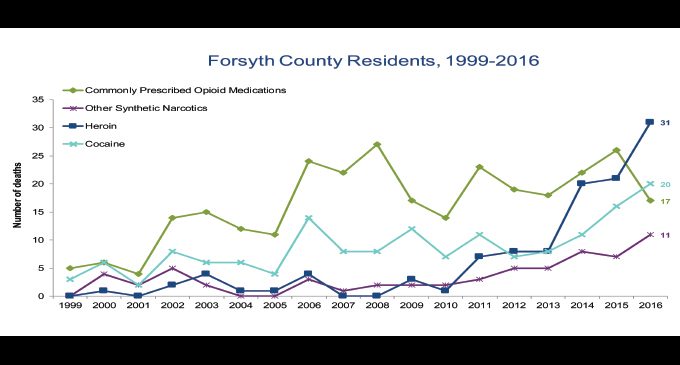Opioid Task Force tackles addiction epidemic

Forsyth County’s Opioid Task Force is working to improve the local response to the nationwide opioid epidemic.
EMS Quality Assurance Coordinator Tara Tucker made a presentation on the task force’s efforts during a county briefing last week. Its meetings started in March with a diverse group that includes law enforcement, EMS, medical providers, the Health Department, clergy, the Twin City Harm Reduction Coalition needle exchange and others. Tucker said the meetings help coordinate the effort to fight opioid addiction.
The problem is massive, resulting from decades of over-prescription of painkillers combined with a rise in cheap, illegal opioids on the streets. In 2016, an average of five people died every day from drug overdose in the state, a 410 percent increase from 1999. According to 2014 statistics, for every opioid poisoning death, there are approximately three hospitalizations, four emergency department visits and 380 people who misused prescription pain relievers. There are more drug poisoning deaths in North Carolina than there are car crash fatalities.
In North Carolina, there were 1,252 newborns with drug withdrawal in 2015, compared with only 125 in 2004. It’s becoming so common; Forsyth Medical Center has created a special unit for these babies.
“It’s devastating our families, I think that’s really huge and people don’t always see the effects of how it’s affecting our families,” said Tucker, who added that more children are ending up in foster care because of opioid use in their family.
In 2016, there were 12.9 unintentional overdose deaths per 100,000 people in Forsyth County. Commonly prescribed opioid medications were the leading cause of local overdose deaths from 2001-2015, though the illegal opioid, heroine, was the highest in 2016.
Tucker said the coordination with the task force has helped greatly as they’re able to get substance abusers into treatment faster and help them avoid costly, prolonged visits to the emergency room. There’s also a brochure the task force made with information about what to do if you or a loved is struggling with opioid addiction. She said Emergency Medical Services is implementing software to track trends in opioid related calls and has community paramedics that guide patients though treatment options.
Tucker said she’s starting to see a reduction in emergency overdose calls, which she credits to all the community efforts to help stem the opioid crisis.
Assistant Health Director Tony Lo Giudice said there’s a tremendous response from the community for the task force and that it’s helping find and close gaps so services can reach everyone who needs them. He said the health department is doing its part by providing the overdose prevention drug Narcan at its pharmacy and is taking steps to recognize opioid addiction in those the department serves. He said he was confident that, working together, local efforts can eventually turn the tide on the crisis.
“It’s going to take time and coordinated effort to stop that upward spike,” he said.
The public is welcome to join task force meetings that are held in meeting rooms one and two at the Health Department, 799 N. Highland Ave. The next meeting is Jan. 10 from 12:30-2:30 p.m. Those who need help with opioid addiction can call the EMS’ Mobile Integrated Health at 336- 703-CARE (2273) from 8 a.m.- 8 p.m.
















